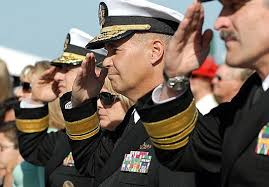New Report by Senior Military Leaders Urges End to Gay Ban
Amidst Inaction by Democrats, Former Pentagon Brass Step Out Front
SANTA BARBARA, CA, – A new study by a team of retired senior flag and general officers from the U.S. military has concluded that the ban on openly gay service members is counterproductive and should end. The nonpartisan study group has a combined century and a half of military service and represents all four branches of the military. It includes the three-star general who, as Deputy Assistant Secretary of Defense, led the Military Working Group that devised “don’t ask, don’t tell” in 1993. And it marks the first time a Marine Corps general has ever called publicly for an end to the gay ban.
The authors of the study, which was released today, issued ten findings and four recommendations, including that the law impedes the military from adapting to changing circumstances. The group further found that the policy prevents some gay troops from performing their duties and obtaining the support they need while fighting the nation’s wars, and forces them to lie to their peers. At the same time, it found that gays already serve openly, that tolerance of homosexuality in the military has grown dramatically, and that lifting the ban is “unlikely to pose any significant risk to morale, good order, discipline, or cohesion.”
Experts say the officers’ study is part of a trend of vanishing resistance to equal treatment in the military for gay troops, particularly among retired military leaders who—freed from pressure to conform to the military’s party line—have surpassed lawmakers in calling for repeal of “don’t ask, don’t tell.” Democrats, in particular, have taken criticism recently for inaction on repeal, despite a sizable number of them taking public positions in favor of ending the gay ban. “What’s standing in the way of repeal,” said Dr. Aaron Belkin, director of the Palm Center, a research organization at the University of California, Santa Barbara, “is politics. The research on this issue supports equal treatment, a majority of Americans favor openly gay service and increasingly members of the military favor ending the gay ban, but many politicians still favor the status quo.” The Palm Center commissioned the new report by the group of generals and admirals, who required that Belkin put in writing that the Center would provide research and support but would not seek to influence the conclusions of the officers.
The officers’ report is the latest in a growing tide of calls by military leaders for an end to the current policy, which allows gays and lesbians to serve only if they conceal their sexual orientation and remain celibate on- and off-base. General John Shalikashvili, the former Chair of the Joint Chiefs of Staff, who previously favored the gay ban but reversed course last year in an op-ed in the New York Times, released a statement endorsing the officers’ new study. The statement called the study “one of the most comprehensive evaluations of the issue of gays in the military since the Rand study fifteen years ago,” and said it “ought to be given serious consideration by both Congress and the Joint Chiefs.”
In addition to Shalikashvili, a group of twenty-eight retired U.S. flag officers released a statement last fall calling for repeal, saying that ending the current policy “would not harm, and would indeed help, our armed forces.” The group pointed to countries such as Britain and Israel which both ended their gay bans years ago. “Our service members are professionals who are able to work together effectively despite differences in race, gender, religion, and sexuality,” their statement said. “Such collaboration reflects the strength and the best traditions of our democracy.”
Belkin said the latest officers’ report was just the kind of research now being called for by people like former Senator Sam Nunn, who led Congressional opposition to lifting the gay ban in 1993, and who is widely seen as the force responsible for writing the current gay ban into law. Nunn told reporters this month that “times change” and he believes it is now time to reconsider the ban. “Not only Nunn, but Nancy Pelosi, the Democratic House Speaker,” said Belkin, “have called for military officials to study this issue and make a recommendation based on the latest evidence about whether integrating open gays into the military helps or hurts our armed forces. The officers’ study is exactly the kind of research these political leaders are asking for.” He added that the military sociologist credited with authoring “don’t ask, don’t tell,” Charles Moskos, who died last month, had also called for a commission to study the gay ban in the months before he died.
Republicans and Democrats have generally divided in their positions on openly gay service, with Sen. John McCain, the likely Republican presidential nominee opposing it while Sen. Barack Obama, the likely Democratic nominee, in favor. Although Obama has come out in support of repeal, he said in a recent interview that he couldn’t promise to be out in front on this issue, but could “reasonably see” an end to the current policy if he becomes president. Despite partisan differences, over 140 lawmakers in Congress have signed onto a bill to repeal the current policy, including a number of Republicans. Rep. Susan Davis, Democrat of California, has said she will hold hearings on the issue some time this year.
